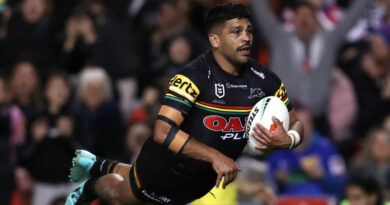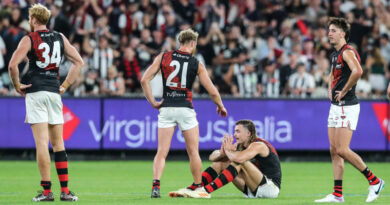Government should consider enforcing return to play protocols, Senate concussion inquiry finds
Save articles for later
Add articles to your saved list and come back to them any time.
The federal government should set up a national sports injury database as a matter of urgency and consider whether government should enforce return to play protocols for sporting competitions such as the AFL and the NRL as a result of a bipartisan senate inquiry into ‘Concussion and Repeated Head Trauma in Contact Sports’.
The report tabled on Tuesday recommended the government play a greater role in funding and monitoring research into concussion and, with medical experts, develop return to play protocols – adaptable across all sports – for both children and adults who incur a concussion or suffer a head trauma.
The inquiry, which occurred amid calls for major sporting organisations such as the AFL and the NRL to do more to protect the welfare of players diagnosed with concussion, contains 13 recommendations including “consideration being to whether any existing government bodies would be best placed to monitor, oversee and/or enforce concussion-related rules and return to play protocols in Australian sports”.
The AFL and the NRL have self-regulated without government intervention and relied on international concussion consensus statements to develop policy.
The AFL’s legal executive Stephen Meade said the league took the issues surrounding concussion seriously.Credit: Jason South
In presenting the report Greens Senator Janet Rice exhorted the government to implement the recommendations which included a recommendation that “professional sporting codes and players associations consider ways for a best practice model to provide ongoing support, financial and otherwise, to current and former players affected by concussions and repeated head trauma.”
However, she noted that the report contained the word “consider”, indicating that was a watering down of the Greens’ preferred recommendation. The AFL has been considering a no-fault compensation fund to provide financial support for former players affected by concussion. The committee encouraged professional sports organisations to ensure their athletes have insurance coverage for head trauma.
James Tedesco is treated for concussion after Bailey Simonsson’s high shot.Credit: Getty Images
The AFL have been criticised for the way they have managed concussion after they were forced to investigate the actions of former key concussion advisor and associate professor Paul McCrory when he was accused of plagiarism. McCrory ultimately resigned from his advisory role with the AFL, after urging it to take a more conservative approach to the “return to play” timeframes in its draft concussion protocols.
After the report was released in October last year CEO-elect Andrew Dillon apologised for underfunding a research project into the effect of concussion on past players but claimed the AFL’s concussion policies were sound. They say they have made more than 30 changes to rules and the tribunal guidelines since 2005 in an attempt to make the game safer to play and deter head high contact.
Port Adelaide teammates Aliir Aliir and Lachie Jones are treated after they collided in round 20Credit: Getty Images
The AFL’s concussion protocols require players to sit out a minimum of 12 days if they are diagnosed with a concussion in a game or at training. The NRL has a similar stand down policy if a player is concussed with the 11-day stand down period introduced at the start of the season.
There have been four former AFL footballers – Danny Frawley, Shane Tuck, ‘Polly’ Farmer and Murray Weideman – diagnosed with CTE with Tuck’s suicide the subject of an inquest in the Victorian Coroner’s Court.
NRL and AFL representatives appeared at the inquiry with both bodies accepting a link between chronic traumatic encephalopathy (CTE) and head trauma.
The late Danny Frawley’s wife Anita told the inquiry a no-fault compensation scheme to support past players and their families suffering from the impact of head trauma should be introduced. She outlined in harrowing detail the effect of head knocks on her late husband’s brain.
Four AFL players have retired due to the effect of concussion in the past month and Port Adelaide were fined $100,000 after their player Aliir Aliir was sent back onto the ground following a heavy collision without the club’s doctor conducting a SCAT-5 test as required under the concussion protocols.
Multiple class actions have been lodged in the Victorian Supreme Court seeking compensation for more than a hundred players who allege their health was adversely affected as a result of head knocks sustained during their playing career. The courts have urged the complainants to merge their actions.
The senate inquiry had four public hearings and accepted more than 100 submissions from professionals, people with family members affected by concussion and members of the public.
Public Health Association of Australia CEO Adjunct Professor Tim Slevin said reducing head trauma was critical to ensuring participation in sport remained high.
“Changing how professional sport is played and managed, with a focus on preventing concussion, will flow down to the grassroots and so benefit hundreds of thousands of people who play community sport on weekends,” Slevin said.
If you or someone you know needs help, contact: beyondblue 1300 224 636 or beyondbluebeyondblue.org.au; Suicide Line 1300 651 251; Lifeline on 13 11 14 or visit lifeline.org.au.
Most Viewed in Sport
From our partners
Source: Read Full Article






